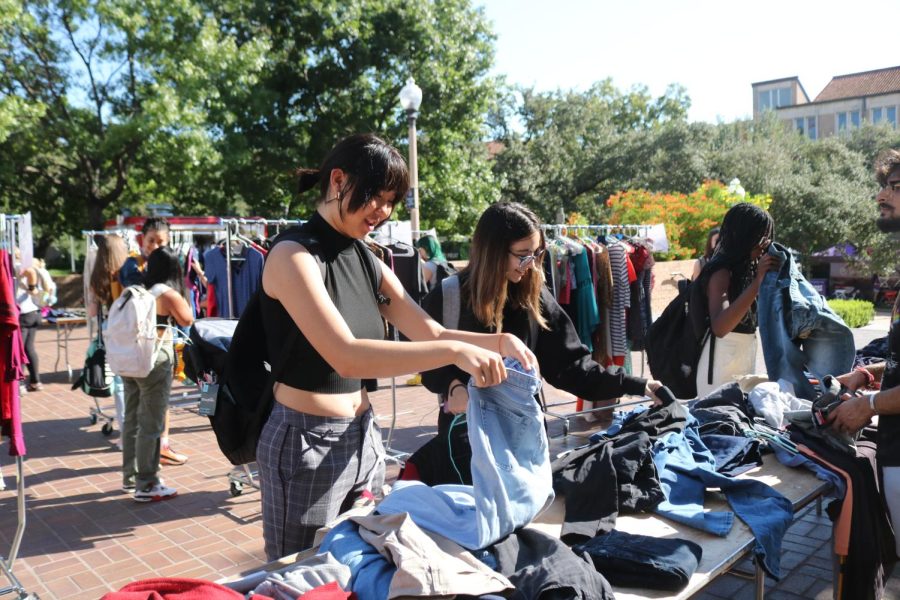Thrift pop-up event strives for sustainable, accessible fashion options within the UT community
September 26, 2022
Braving the morning rush, a sea of half-awake students sifts through racks of clothing, plastic hangers softly clacking against each other, as they pick out pieces and show off their finds.
The Campus Environmental Center’s Trash to Treasure project team hosted their first of three thrift pop-up events for the fall semester at the Perry-Castañeda Library plaza on Wednesday. The organization acquired clothes at the end of last spring semester through its partnership with UT dormitories, where they collected bedding, clothes and food donations from students. In addition to giving bedding and food donations to Austin Mutual Aid and UT Outpost respectively, the Center resells clothing items at low prices at their pop-up events to make living essentials more accessible for students.
Trash to Treasure co-lead Kate Weidner said the organization collected around 6000 pounds of donations from UT dormitories last spring to be recirculated back into the community.
“Our project has a nice reach, and it’s definitely accessible,” the government senior said. “Keeping the items within (UT) — making sure that they are redistributed — also gives a sense of community.”
Trash to Treasure co-lead Lauren Smith said while sorting and storing donated items often creates logistical challenges, the organization also faces problems in clearly conveying the project’s core mission to prioritize sustainability and accessibility at their thrift pop-up events.
“It’s hard to communicate (our message and goals) when there’s a bunch of people at the sales just seeing cheap items,” said Smith, a textiles and apparel design senior. “They might not know our purposes are about sustainability.”
While she acknowledges the affordability and accessibility of fast fashion, Smith said the recent popularity of brands like SHEIN among TikTok and Instagram influencers promotes fast fashion overconsumption — a trend that exacerbates problems of unethical labor practices and unsustainable production cycles.
“We hope we can provide accessible options of sustainable fashion since they’re priced at $1,” Smith said. “(We hope) that people can turn to (our project), instead of buying new from these (fast fashion) places, and decrease that consumption.”
After hearing about the thrift pop-up through Instagram, biochemistry sophomore Caricia Aguilar said the group’s passion and commitment shines through in their efforts to raise awareness for their event in the UT community.
“It seems like they genuinely care and enjoy what they’re doing,” Aguilar said. “That influences people to have a better attitude towards shopping secondhand.”
Weidner said the organization aims to encourage students to get involved in their project through both thrift events and prep days where they sort through donations.
“Everybody’s collective action can help,” Weidner said. “Hopefully sustainability can become conscious to people who don’t worry about it.”
Although she struggles with the idea of her own sustainable fashion efforts making a difference, Aguilar said the organization’s emphasis on collective action encourages her to participate in future Trash to Treasure volunteer and donation opportunities.
“As you get older, you become more aware of these problems that we need to fix, especially because we’re the ones who have to live in the world in the future,” Aguilar said. “If you can do anything to make a difference, maybe it’ll rub off on other people.”












